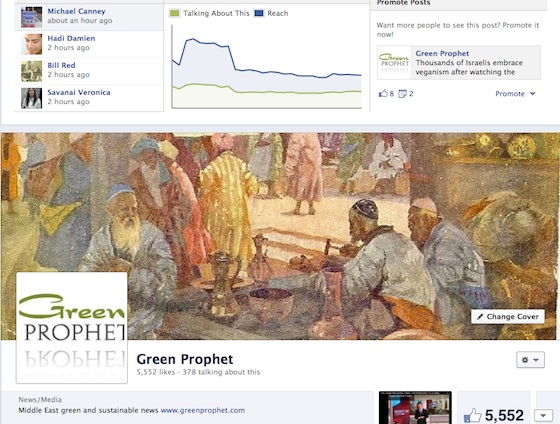 When I first took over Green Prophet’s Facebook page, we had just over 1,000 likes. That was about one year ago. Now we have just over 5,500, and communicate with dozens of people on a daily basis.
When I first took over Green Prophet’s Facebook page, we had just over 1,000 likes. That was about one year ago. Now we have just over 5,500, and communicate with dozens of people on a daily basis.
That number may seem small – especially when compared to a handful of “green” blogs in the US that have been around longer than us – but given Green Prophet’s unique niche – comprehensive environmental coverage in a region fraught with longstanding political problems – this growth was earned through a series of very careful and thoughtful processes. Hit the jump for a list of our most important pointers that will help you grow your blog in the Middle East.
Most of these pointers apply to blogs with any kind of readership but a few of them are particularly useful in the Middle East, where so many cultures, religions and viewpoints converge in often explosive ways.
1. Post Relevant Content:
A blog, by definition, requires readers, so it is enormously important to keep the reader in mind when sharing stories and communicating on Facebook. What stories interest your readers? What news will help them make informed decisions in their own lives? What will inspire, delight, and uplift? What will enrage, and therefore lead to some kind of positive action?
Facebook is a wonderful tool that allows us to build communities of like-minded people in relatively short periods of time. Being a part of that community is a privilege that demands responsible participation. So, if you run a green blog like Green Prophet, you probably don’t want to post a pile of self-help quotes or stories about the latest toenail polish. Keep it real and keep it relevant.
2. Develop a Relationship With Readers
For the last couple of years, I’ve filtered through thousands of professional Facebook pages looking for news and inspiration. In that time, I’ve decided that there are basically two types of profiles: those that bombard or spam readers with stories without any give or take and those that cultivate a meaningful relationship with their readers.
Hopefully it goes without saying that you want your page to be like the latter. The biggest mistake you can make is to post a story in your status update and then ignore your readers’ comments, or to post infrequently and then feel jilted when there are no Likes or Shares. (And while we’re on the subject, neither a Like or a Share is a numerical thing. Both signal that another human being appreciates what you have taken the time to produce and they believe it’s worthy of other people doing the same.)
3. Be a Real Person
This may seem really strange, but it is very important to remember that despite the physical difference that separates you from your reader, online people are real too. Which means they want to communicate with other real people. When we post stories on Facebook, we try to be as personal as possible and acknowledge our readers by name. Likewise, we always err on the side of transparency.
Sometimes we post stories that are really difficult for some of our readers to face because they come from a country or religion at odds with their own. This is the reality of the MENA region. But instead of hiding from it, we face it head on – without any kind of bias or aggression. Everyone is free, after all, to pick and choose what they do and don’t want to read.
4. Be Consistent
We try really hard to be consistent on Facebook so that our readers can rely on us. Again, the spatial element of online communication makes it difficult to remember that we’re dealing with real people who have regular habits. If Jolene Grenophet goes on Facebook every morning expecting to find the latest green news from the Middle East and North Africa, we don’t want to disappoint her by posting nothing for days on end.
Of course, Green Prophet is a small operation, so it’s not always possible for the social media person (that’s me) to be present every day, and many of you are probably in the same boat, but it is very important to shoot for consistency at least 90% of the time.
5. Set the Tone of Your Facebook Page
You get to set the tone of your own blog and Facebook page, so be sure to know what kind of tone you want to set. If you want to establish an antagonistic environment, then you might not mind if people use foul, inciting language in their responses. But if you want to create a healthy environment conducive to civil dialogue, then it’s important to constantly monitor whether or not that tone is being respected.
This isn’t easy, and each new exchange has to be taken at face value. Sometimes people swear on Green Prophet and we let it go, if it’s a one-off thing, in the name of free expression. As for readers who are just cranky, we either ignore them or use humor to cheer them up a little. But the minute we notice any kind of racial or religious prejudice, or personal assaults, we immediately ask that person to refrain from such behavior (publicly in order to set the tone for the rest of our readers as well), and if they decline to desist, we ban them.
6. Honor Diversity
This might be the most important tip we can give you. The world is comprised of many different people from as many different backgrounds. Each has a unique understanding of the world based on millions of different impressions and experiences, so it is absolutely critical to give voice to every single one of them – no matter how much their viewpoint contrasts with your own.
Many times our readers have taken us to task for certain posts and we don’t always agree with their comments, but we honor them. We show respect. And above all, we try as often as possible to express our gratitude to our readers for choosing us despite the numerous other online options available to them.



